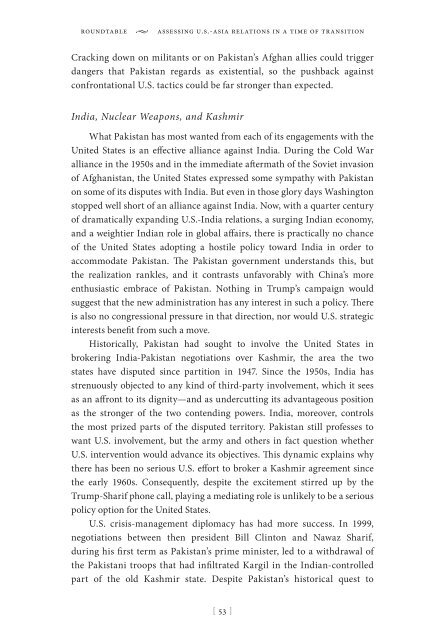2jBVKVf
2jBVKVf
2jBVKVf
Create successful ePaper yourself
Turn your PDF publications into a flip-book with our unique Google optimized e-Paper software.
oundtable • assessing u.s.-asia relations in a time of transition<br />
Cracking down on militants or on Pakistan’s Afghan allies could trigger<br />
dangers that Pakistan regards as existential, so the pushback against<br />
confrontational U.S. tactics could be far stronger than expected.<br />
India, Nuclear Weapons, and Kashmir<br />
What Pakistan has most wanted from each of its engagements with the<br />
United States is an effective alliance against India. During the Cold War<br />
alliance in the 1950s and in the immediate aftermath of the Soviet invasion<br />
of Afghanistan, the United States expressed some sympathy with Pakistan<br />
on some of its disputes with India. But even in those glory days Washington<br />
stopped well short of an alliance against India. Now, with a quarter century<br />
of dramatically expanding U.S.-India relations, a surging Indian economy,<br />
and a weightier Indian role in global affairs, there is practically no chance<br />
of the United States adopting a hostile policy toward India in order to<br />
accommodate Pakistan. The Pakistan government understands this, but<br />
the realization rankles, and it contrasts unfavorably with China’s more<br />
enthusiastic embrace of Pakistan. Nothing in Trump’s campaign would<br />
suggest that the new administration has any interest in such a policy. There<br />
is also no congressional pressure in that direction, nor would U.S. strategic<br />
interests benefit from such a move.<br />
Historically, Pakistan had sought to involve the United States in<br />
brokering India-Pakistan negotiations over Kashmir, the area the two<br />
states have disputed since partition in 1947. Since the 1950s, India has<br />
strenuously objected to any kind of third-party involvement, which it sees<br />
as an affront to its dignity—and as undercutting its advantageous position<br />
as the stronger of the two contending powers. India, moreover, controls<br />
the most prized parts of the disputed territory. Pakistan still professes to<br />
want U.S. involvement, but the army and others in fact question whether<br />
U.S. intervention would advance its objectives. This dynamic explains why<br />
there has been no serious U.S. effort to broker a Kashmir agreement since<br />
the early 1960s. Consequently, despite the excitement stirred up by the<br />
Trump-Sharif phone call, playing a mediating role is unlikely to be a serious<br />
policy option for the United States.<br />
U.S. crisis-management diplomacy has had more success. In 1999,<br />
negotiations between then president Bill Clinton and Nawaz Sharif,<br />
during his first term as Pakistan’s prime minister, led to a withdrawal of<br />
the Pakistani troops that had infiltrated Kargil in the Indian-controlled<br />
part of the old Kashmir state. Despite Pakistan’s historical quest to<br />
[ 53 ]


